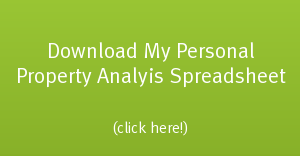The following is a post from one of my favorite authors Alan Corey. Alan has been featured in multiple media sources such as US News & World Report, Money Magazine, The Boston Globe, The NY Post, CNN, CNBC, ABC, and Fox. He has also appeared on several nationally and internationally-broadcast television shows including Bravo’s Queer Eye, NBC’s The Restaurant and the ubiquitous The Jerry Springer Show.
I first read his book “A Million Bucks by 30” several years ago and it quickly became one of my favorite financial books around. Alan was awesome enough to take some time writing a post just for RealEstateInYourTwenties.com. Besides being an all around awesome guy, he also has great insight and experience into how to use real estate to propel your future. Thanks Alan!
 How to Save Money when Buying a Rental Property
How to Save Money when Buying a Rental Property
By: Alan Corey
Alan Corey is the author of “A Million Bucks by 30”. You can learn more about him and his book at www.alancorey.com.
If you are looking into buying real estate to rent out for some passive income, it all comes down to buying a property at the best price possible. The following are some tips I’ve employed to get the purchase price down as little as possible, sometimes saving me as much as 25% on the purchase price.
The number one way to instantly save on a purchase price is to make your offer before a property is listed with a real estate agent or broker. The seller of a property is responsible for the fees paid to real estate agents and brokers, which can run around 5-7% of the purchase price. Knowing this, many properties are listed higher than necessary by homeowners just to cover these selling fees. So getting ahead of the agents can instantly save you 5-7% on your home purchase.
For me, finding properties that are not listed yet takes some leg work (literally). I begin by walking around neighborhoods I’m interested in buying in. If I see a vacant or abandoned home, I’ll talk to neighbors who may know who I could contact about purchasing it. Sometimes there are unclaimed mail and magazines on the front step for you to get a name, leading your internet research in locating the owner. You may stumble upon a house in pre-foreclosure, which could allow you to purchase it at a deeply discounted price.
Furthermore, while on my neighborhood walk, if I see a house getting renovated or under construction, it’s an also sign I have a chance to beat the real estate agents. Many times these houses are owned by house flippers looking to unload of the property as fast as possible. So the key here is to get in before the work is done. Often house flippers choose to put in expensive upgrades to have the house sell quickly by distinguishing it from other homes on the market. I’ve negotiated a lesser workload and lesser upgrades on a construction site in exchange for a reduced home price, to the benefit of both parties. A house flipper is always worried about carrying costs of a house while it sits on the market and secondly, a quick sale will allow him to start looking for his next project. In the end, the house sells for less money, which in turn saves you a lot of coin.
Lastly, walking and talking to people you meet in a neighborhood is another word of mouth way to network for properties. Someone you meet may know about a house about to get listed or one that was just taken off the market because it didn’t sell (a sign the agent contract has expired.) You can even talk to renters who are about to move out, which may be a concern to the homeowner and help pave the way for you to get a purchase offer on the table. Either way, you can start talking at a lower price point and it may lead you to bargain deal.
To recap, get in on a property before the agents do. Most times the cost savings all come down to timing. Cutting out the middle-man is a great way to save money, so the best time to buy a rental property is when you can buy it directly from the owner. It may take some patience and some persistence, but that’s the foundation of a great real estate buy. And great real estate buys make successful real estate investors.
P.S. looking for hard money loans in California? Be sure to check out my friends over at northcoastfinancialinc.com. They have very competitive rates, can fund within a week and specialize in fix and flip loans and other hard money loans.
 If this is your first time here at Real Estate In Your Twenties.com - welcome!
If this is your first time here at Real Estate In Your Twenties.com - welcome! 





